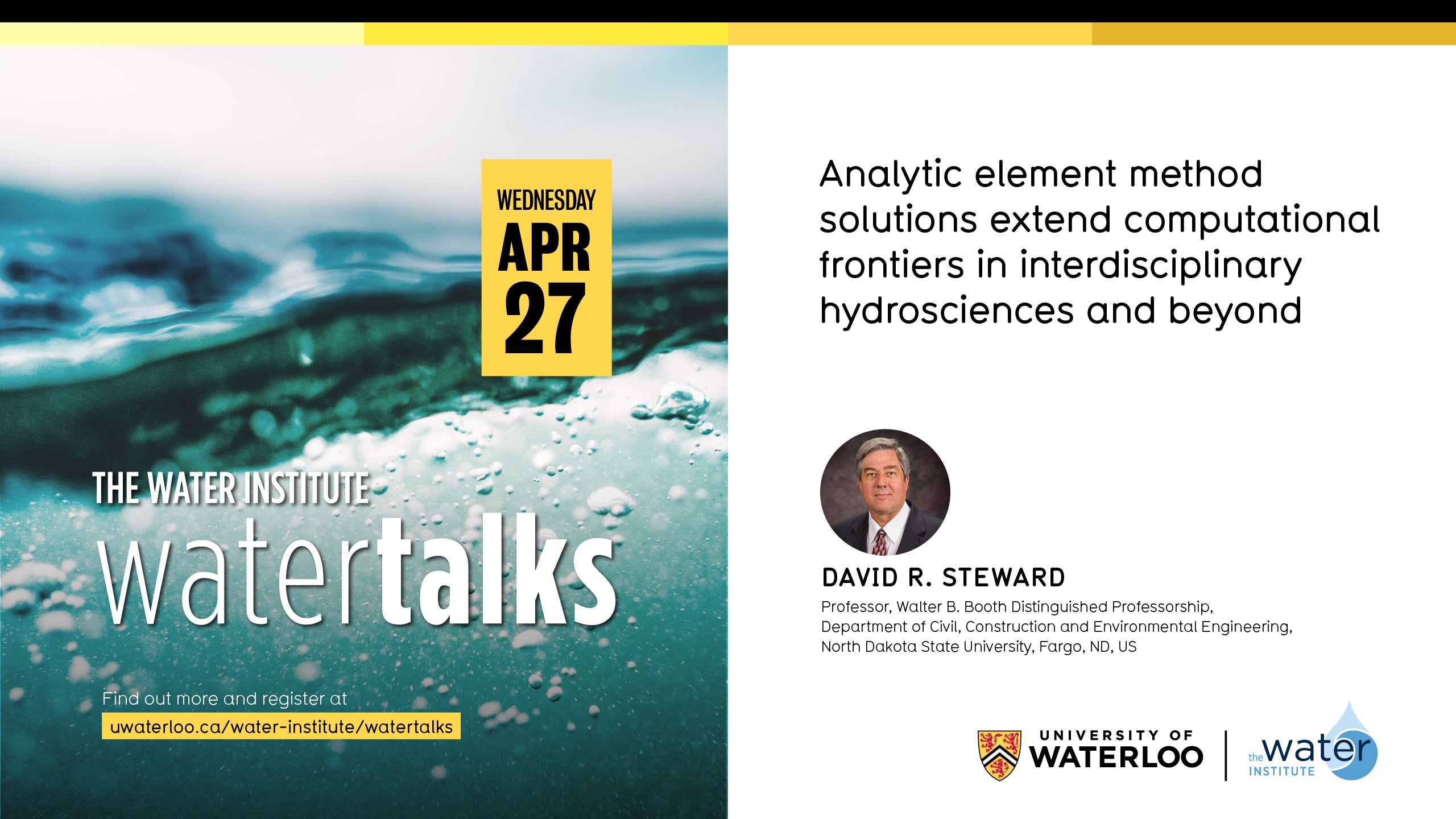
As part of the Water Institute's WaterTalks lecture series, David R. Steward, Professor, Walter B. Booth Distinguished Professorship, Department of Civil, Construction and Environmental Engineering, North Dakota State University, Fargo, ND, will present: Analytic element method solutions extend computational frontiers in interdisciplinary hydrosciences and beyond.
More
information:
How
can
analytic
solutions
help
us
to
better
understand
the
problems
we
face
in
earth
sciences,
civil
engineering
and
related
applications?
New
advances
using
the
Analytic
Element
Method
(AEM)
employ
straightforward
mathematical
methods
to
achieve
nearly-exact
solutions,
and
extend
the
frontier
of
computational
methods.
Wide-ranging
examples
are
presented
for
problems
in:
groundwater/surface
water
interactions,
well
hydraulics,
fractures
and
heterogeneities
with
groundwater
flow,
vadose
zone
processes
in
heterogeneous
soils,
and
capture
zones
to
identify
the
source
of
groundwater
uptake
by
plants.
Coastal engineering applications model near-shore wave interactions as well as the propagation of tsunamis through bathymetric shoals. Related AEM solutions exist to study thermal conduction, electrical conduction, fluid flow, gravity waves and acoustics, and elastic deformations. This presentation introduces recent advances in Steward (2020), "Analytic Element Method: Complex Interactions of Boundaries and Interfaces". A live-demonstration will show how to easily use open-source computer code, available from the companion website at Oxford University Press.
Speaker
bio:
David
R.
StewardProf.
David
R.
Steward
holds
the
Walter
B.
Booth
Distinguished
Professorship
in
the
Department
of
Civil,
Construction
and
Environmental
Engineering
at
North
Dakota
State
University.
He
received
degrees
in:
PhD
Civil
Engineering,
MS
Civil
Engineering,
MS
Mathematics,
and
BS
Civil
Engineering;
all
from
the
University
of
Minnesota.
Academic
appointments
began
as
post-doctoral
research
associate
at
the
University
of
Minnesota
and
in
Marine
Sciences
at
the
University
of
Maine,
before
faculty
appointment
at
Kansas
State
University
and
North
Dakota
State
University.
Prof.
Steward
leads
a
research
program
addressing
the
grand
challenge
of
water
resources
for
society
through
two
complementary
approaches.
One
research
focus
is
interdisciplinary
water
resources
studies
with
collaborations
across
colleges
of
agriculture,
architecture,
arts
&
sciences,
education,
engineering,
and
veterinary
medicine.
These
endeavors
have
been
funded
as
lead
or
co-principal
investigator
from
funding
agencies
such
as
NSF,
USDA,
US
EPA,
and
many
other
local
and
international
agencies
and
consulting
firms.
Discovery
of
the
critical
factors
that
control
water
resources
systems
have
been
identified
through
these
collective
interactions,
results
have
been
disseminated
in
the
best
journals,
and
actively
communicated
with
a
wide
range
of
water
stakeholders.
The
second
research
focus
is
development
of
advanced
methods
of
mathematical
analysis
for
engineering
problems
using
the
Analytic
Element
Method.
The AEM has emerged over decades of groundwater studies, and enables nearly exact solutions to study complicated interactions of flow through aquifer features. The methods of the AEM have been extended to a broad range of engineering applications, and presented comprehensively in recent book with Oxford University Press, available at: global.oup.com/academic/product/analytic-element-method-9780198856788